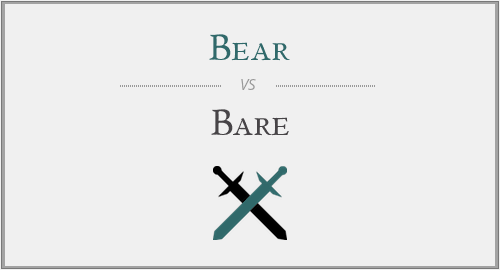They may be pronounced just the same, but “bear” and “bare” can definitely not be confused in an expression. They represent completely different things and should never be misspelled.
Both words have double functions, both working as verbs and noun, respectively adjective, so it’s quite tempting to spell them wrongly due to the similar way they sound. So take a look upon the explanations provided below to make sure you never forget what each signifies and how to use “bear” and “bare” correctly every time!
Bear vs. Bare
Both “bear” and “bare” are words with multiple functions, as parts of speech. They can be used as verbs, as well as noun/adjective, yet each will have a different meaning and use.
“Bear” is one of the most usual and basic English nouns, referring to the large animal every person can recognize, while as a verb it refers to “accepting” or “supporting” something. “Bare”, on the other hand, is an adjective referring to something “not covered” or “not dressed up”, while as a verb it illustrates the action of uncovering, revealing or taking away something that covered a certain surface.
When do we use “bear”?
“Bear” is used as a noun when it defines the large, furry, strong wild animal. When used as a verb, it fits in any sentence where you need to express the acceptance of something unpleasant, the support of a certain weight or the action of carrying something. Here are some relevant examples where “bear” perfectly fits:
Example 1: The bear that cared for Mowgli in Jungle’s Book was named Baloo. – a “bear” is a large, wild, strong animal, with a thick fur.
Example 2: I can hardly bear your parents, they are so suffocating! – “bear” refers to accepting something unpleasant.
Example 3: Do you think that shelf can bear such a weight? – “bear” can refer to supporting a weight.
Example 4: I saw him bear a tray of tea and cookies for everyone. – “bear” is also a perfect synonym for the action of carrying something.
When do we use “bare”?
“Bare” is basically used as an adjective, describing something that is uncovered or not covered, something that has no clothes on or which is empty. Occasionally, it’s also used as a synonym for “basic”, as you will see in a minute in the examples below. The word, anyway, can also be used with a similar meaning as a verb, referring to the action of taking away something that covers an object in order to expose it.
Example 1: She stepped on the grass with bare feet, enjoying its soft texture and warm temperature. – “bare” refers to something without clothes.
Example 2: I put the glasses on the bare table from the kitchen. – “bare” can also describe something that is not covered by anything.
Example 3: I entered the house, but there were only bare rooms. – “bare” is also used to describe something empty.
Example 4: Animals only look forward to satisfying their bare necessities, unlike people who have other objectives in life as well. – occasionally, “bare” can also replace the word “basic”.
Example 5: The dog wouldn’t bare its teeth even after it was offered food and toys. – “bare” as a verb refers to uncovering, exposing something.
Conclusion
“Bear” and “bare” are used in several contexts, with multiple meanings, but they never actually have a common point, where they can replace each other. This makes it essential that you don’t confuse them, as well as mandatory to clearly distinguish their definitions and the correct way to use them. If you remember the explanations above, anyway, it will be enough so you never misspell these words.





Have a discussion about this article with the community:
Report Comment
We're doing our best to make sure our content is useful, accurate and safe.
If by any chance you spot an inappropriate comment while navigating through our website please use this form to let us know, and we'll take care of it shortly.
Attachment
You need to be logged in to favorite.
Log In